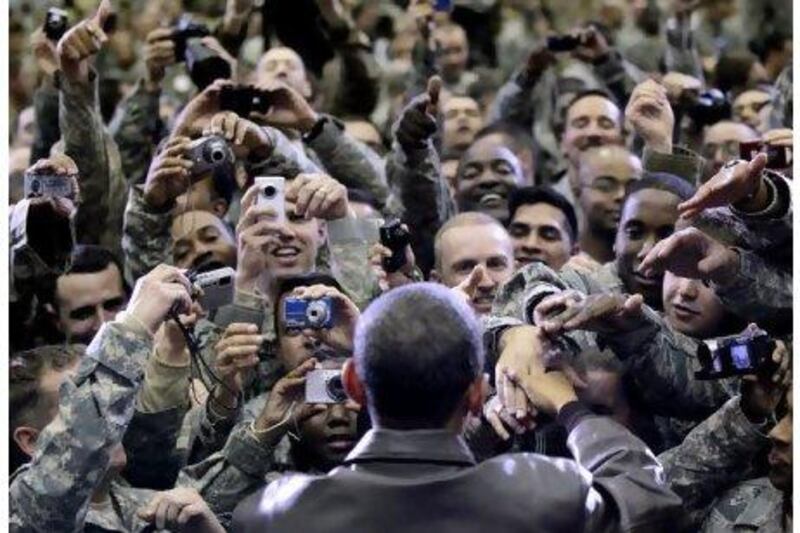WASHINGTON // Barack Obama, the US president, is expected to announce today the number of US troops to be withdrawn from Afghanistan next month.
The US has said it will completely withdraw from Afghanistan by the end of 2014, but much will be read into the size of the first withdrawal and how soon the following ones are scheduled.
It had initially been expected the first withdrawal would largely be a symbolic reduction in the number of support troops. But a more significant reduction will probably now be announced.
Jay Carney, the White House press secretary, refused on Monday to be drawn in on any specific numbers, but did say the US already had a "robust" force in Afghanistan before the surge, which began early last year.
This suggests the initial phase of withdrawal, to be completed by the end of this year, could see all of the 33,000 troops moved out. According to a report in The Washington Post, this will begin with between 3,000 and 5,000 troops next month.
The senior US military leadership is understood to be cautious about any significant reduction of troops for fear it might hand back territory won from the Taliban since last year.
Robert Gates, the secretary of defence who will retire next week, has advised it is too soon to alter strategy in Afghanistan as talks with Taliban negotiators, revealed this week by the Afghan president, Hamid Karzai, show no sign of progress.
The US spends almost $2 billion (Dh7.34bn) a week in Afghanistan and there is growing war weariness among Americans.
Its presence in the country is a significant strain on an economy that has yet to shake off the effects of the financial crisis of 2008 and, with unemployment at more than 9 per cent, several legislators are arguing the money could be spent better at home.
With elections looming next year, Republican presidential hopefuls were divided over the war in a recent televised debate.
Mr Obama's liberal anti-war base is at odds with hawkish Democrats who argue the US mission in Afghanistan is not yet done.
The killing of Osama bin Laden last month only renewed questions over the purpose of the war. Polls repeatedly show most Americans now want US troops out of Afghanistan.
Celeste Ward Gventer, the associate director of the Robert S Strauss Centre for International Security and Law at the University of Texas, said that after 10 years it was difficult for people to remember that the reason for the war was to punish Afghanistan for harbouring bin Laden and Al Qaeda, and remove the Taliban from power.
With those achieved, Ms Gventer, a former deputy assistant secretary of defence, said "it certainly does raise the question of exactly what it is that we're doing there".
But there was never a strong rationale for the US presence in the first place, she added, and it was time the US began to take a "hard-nosed look" at what the war was worth to American interests.
"I think that we've been deeply out of balance in terms of the real rewards, real interests of the US and the amount of energy and expenditure we were putting into that place," Ms Gventer said.
She acknowledged there were legitimate concerns about what would happen after the US pulled out.
But Ms Gventer suggested the problem was mainly regional, and one that neighbouring countries such as Pakistan had not engaged with seriously enough since the US occupied Afghanistan in 2001.
Mr Obama will probably try to strike a balance between public and economic pressure, and advice from the military as he assesses the future strategy for Afghanistan.
But what Ms Gventer called "bumper sticker" politics is already starting to affect considerations, and the administration needs to ensure it is at least seen to be bringing an end to the war.
"[The administration is] highly susceptible to the argument, 'why are we building schools and roads and infrastructure in Kandahar, and not in Racine?'"Ms Gventer said, referring to the Afghan city and the one in the US state of Wisconsin.





